It was FRIGID. Low 20s with 10-15mph winds. The whole time we were in Poland the wind persisted and the temperatures didn't rise above about 28 degrees. It was rough to say the least. At night at the Christmas Market, hand warmers and at least 3 layers of clothing was a MUST. So that is what we did! And despite all that, I quickly fell and stayed in love with Krakow, the city my great-great-grandmother came from.
The Christmas Market occupied the largest medieval town square in Europe which is situated next to the beautiful St. Mary's Basilica (early 13th century) and dominated by the picturesque Cloth Market (1555). All of it was just so adorable. It was so quaint and everyone was friendly and the Christmas lights and garland made the medieval square a magical setting for our first evening in Poland. Mum and I walked around checking out the craft booths, the Polish food, and taking pictures. The highlight of the that evening was definitely the chimney cake we shared. I think it is a European treat and not just a Polish one because I saw them in Italy as well. They take dough and bake it in a cylindrical shape. Once hot, the "chimney" of dough is then rolled in some sort of covering like sugar or chocolate. But mum and I went for the cinnamon covering. Oh. My. God. It was heavenly.
The back of St. Mary's Basilica
The Cloth Market in the medieval square
St. Mary's Basilica
St. Mary's Basilica with some Christmas decorations
The Cloth Market with the Christmas Market in front
Mum down in the breakfast room
Our hotel in the day
My favorite square in Krakow. So cute and colorful!
The Cloth Market
I just love all the colors!
Wawel Castle
Wawel
The hill up to the Castle complex
Wawel Castle complex with the Cathedral and Palace in the distance
Me in the courtyard inside the Royal Palace (all bundled up!)
Cathedral center and Palace on the right
Next, we hopped in a plastic-zipped-in, heated buggy for a two hour tour with another Polish guide, Erik. He took us through all of Old Town, seeing the sights and learning the history.
The old medieval walls, gate (the tower) and barbican (defensive structure on the right) guarding the entrance to the Old Town.
Mum and I in front of the National Theatre of Poland
We then went into the Catholic suburb of Krakow and then the Jewish suburb. It was fascinating learning about how the inhabitants of these areas situated so close to one another have coexisted so peacefully for centuries. They may not have personally liked each other but at least they respected each other and were willing to coexist in such close proximity. Go Poland for being so progressive so many years ago.
One of the most popular Catholic churches in Krakow. SO MANY Catholic churches are scattered over the city. The number of synagogs once matched the number of Catholic churches. Sadly, tons were either destroyed during WWII or have since been converted to nonreligious buildings used for other purposes.
Lastly, we visited the place where the Krakow Ghetto was located during WWII. The central square of what was once the ghetto still exists but is now home to a memorial of scattered, empty chairs. The square is still boarded by an empty railway station where Jews from the ghetto were put on trains and transported to labor or extermination camps. The square itself was the sight of dozens (maybe hundreds?) of murders of helpless Jews within the ghetto shot down by sadistic Nazi soldiers "keeping order" in the ghetto. Some of the buildings surrounding the square today have survived from the days of the ghetto. At little distances away from the square, parts of the original ghetto wall still stand. The Nazis made the Jews build those massive walls, the tops of which were to be shaped like typical jewish headstones. Thus, the Nazis were basically forcing the Krakow Jews to build their own prison/graves.
The Chair Memorial
Remains of the Ghetto Wall
Lastly, Erik dropped us off at Schindler's Factory, where Oskar Schindler famously employed tons of Jews in order to save them from being taken to the camps. It was Stephen Spielberg's visit to Schindler's Factory (which is mostly a museum now) that inspired him to direct and produce his famous, Academy Award-winning film, Schindler's List in 1993. The museum reminded me a lot of the Holocaust Museum in Washington DC. But, what was so special about it was that it showed specifically how WWII and the Holocaust effected Jewish Poles and just Poles in general. Poland had only just gained its independence in 1918 after the end of WWI, and Poles were still celebrating a rebirth of their nationality when Germany invaded in 1939. Polish (not Jewish) prisoners were the first to be transported to labor camps and many of those Polish prisoners were the first to be executed in those camps. And obviously, Polish Jews were the Jews targeted for the longest period of time over the course of WWII. The museum gave visitors an idea of how life in Poland was drastically and horrifically changed from the invasion, to the taking of prisoners, to the creation of ghettos, and to the deportation of Polish prisoners and Jews to camps.
That evening, Mum and I ate dinner next to the medieval square before exploring the Christmas and Cloth Markets one last time. The next morning, we packed up our stuff, said goodbye to our adorable hotel, and set off with our original guide, Thomas, to Krakow's famous salt mines. Miles deep and miles in distance, these mines were a huge source of wealth for Poland for centuries. Today, the salt mines survive off of tourism. They are really incredible! Tourists only get to visit the teeny tinniest percentage of the mines, only going down to the 3rd level out of 9. Statues made of salt, steps made of salt, chapels made of salt, murals made of salt; it was really cool! Particularly the main and largest chapel seen below. We turned the corner and there was this massive room all made of salt with massive chandeliers illuminating all the incredible details carved from salt. It took my breath away.
The massive chapel
Floor, walls, alter, pulpit, all salt
The Last Supper made of salt! Incredible.
Another incredible chamber down in the salt mines with stunning wood workings
After our tour of the salt mines, we stopped for lunch before heading to Auschwitz. Knowing that in Krakow we would only be about an hour away from Auschwitz, I told Mum, I had to go. I told her she could stay in Krakow if she wanted! But I felt so strongly that I could not be that close and not see it. She agreed to go with me. It wasn't a trip I could ever say I wanted to take. Rather, I felt I had a duty to go there, to pay my respects, but most importantly, I feel that everyone needs to see what atrocities the human race is capable of. We must learn from our past to prevent such acts of cruelty, hatred, sadism from happening again. Sadly, I know that is not possible. I know that the world is too full of hatred and cruelty. But, more than hatred, cruelty, and sadism, it is ignorance that will lead to humanity repeating the unimaginably horrific acts of its past. I know I am just one person. What kind of difference can I make in preventing the repetition of the past by visiting Auschwitz? But you know what they say. You have to start somewhere. Tell others about it. Inspire others to witness the horrors of the past too. Educate. Educate. Educate. Destroy ignorance, one person at a time.
The entrance to the camp
My favorite quote.
One of the memorial plaques at Auschwitz-Birkenau. There are plaques in all the language spoken by the Jews who were murdered at Auschwitz. They all read the same thing: "Forever let this place be a cry of despair and a warning to humanity, where the Nazis murdered about one and a half million men, women, and children, mainly Jews from various countries of Europe."
Auschwitz-Birkenau: railway tracks and prisoner bunkers in the distance.
That evening, Thomas dropped us off at the Krakow train station. We were scheduled to take a sleeper train from Krakow to Vienna. We would then take a 2.5 hour train from Vienna to Salzburg, Austria where we had a whole day of touring planned. Around 2:30AM, as we slept in our bunks on the train, Mum and I got a knock on our cabin door. And then another knock. And another. We finally opened the door to find one of the train workers. He informed us that because of ice on the train tracks the train was being turned around. We were returning to Krakow. But we had two choices! Either return to Krakow on that train OR get off with all our belongings, at 2:30AM in the middle of nowhere in the Czech Republic, and find another way to get to Vienna. Eventually, we resolved to stay on the train and return to Krakow, knowing that all of our touring in Salzburg (fortress, cathedrals, Old Town, Christmas Markets, and 3 hour The Sound of Music tour) was now off the table.
We arrived back in Krakow at 6:30AM (around the time we were supposed to arrive in Vienna) and were met with little to no options. Not only did we want to go to Salzburg, but the rest of our plans relied on us getting there. But there were no buses, the only trains were night trains, and plane tickets were $1200 per person. Eventually, a girl we had met on the train told us that a German man, who was also on the train and eager to get to Vienna, knew a guy who had an 8-seater van and would be able to get us to Vienna by the afternoon. Of course, we were a little leery. First of all, the German man spoke no English, so we had to hear about those plans through a translator, a man who was also on the train and knew both English and German. And the fact that the German man knew "a guy with a van" sounded pretty sketchy. But, apparently, this "guy's" job was, in fact, to transport people between Krakow and Vienna every weekday. So, after mum got all the details through the translator, we decided to go for it! So, along with one other girl and four guys, we got in a van and took off for Vienna. We drove through a little blizzard on the Autobaun, but finally arrived in Vienna around 3:00 in the afternoon after 6 hours on the road. Mum and I then hopped on the Salzburg train and arrived around 6:10. It had been a LONG day, and we had missed out on almost everything we had planned to do in Salzburg. BUT we still had about 4-5 hours to enjoy in the city before we had to get to sleep, so we took advantage of every second! And after everything we had witnessed yesterday at Auschwitz and Birkenau, it was truly hard to complain about anything. We had still made it to Salzburg, and we ended up having a lovely evening there.
We freshened up and headed out toward the Old Town of Salzburg. It was a cool, crisp, and hazy night. Because we were supposed to have the Sound of Music tour that afternoon, Mum wanted to go to some of the places we were supposed to have seen on the tour. First, we passed though the gardens where, in the film, Maria and the von Trapp children sang "Do, Re, Mi" around a fountain and over a series of steps. I recognized it immediately! I was a HUGE Sound of Music fan as a little kid and that love has never gone away. We then headed in the direction of the 11th century fortress situated on a big hill overlooking all of Old Town. We crossed over the bridge into Old Town and were greeted by a series of narrow, adorable streets lined with shops and Christmas lights. Next, we explored the main Christmas Market of Salzburg which happened to be situated around the fountain where, in the film, Maria sings "I Have Confidence."
We then headed up the hill towards the fortress. We were supposed to have taken a cable car up to the top and toured it earlier in the day, but at that time in the evening both the cable car and the fortress were closed. But we set off anyway to see how close we could get. We climbed and climbed and got really pretty views of the city from above. We kept walking until we reached the nunnery where the REAL Maria von Trapp trained as a nun before she went to work for the von Trapp family. There is a slight chance we may have been trespassing, but that's okay! It was about 9:15PM at that point, so we decided to stop there and descend back down into the Christmas Markets. We took a bit of a round-about way back to our hotel so we could see more of the city. It was beautiful with all the Christmas lights and quaint streets. When we got back to the hotel, we headed to the roof top bar (enclosed, of course) where we both got drinks (virgin for me, of course). They were necessary after the long night and day we had had.
The fountain around which they sang "Do, Re, Mi" with the fortress in the background
The steps on which they sang "Do, Re, Mi"
The fortress, here we come!
View of Old Town and the fortress from the bridge
the adorable streets
Christmas Market
The ascent begins!
Mum with the city of Salzburg
Found the Nunnery!
Where the real Maria was training to be a nun
the descent down the quintessentially Salzburg streets
Early the next morning, we took a train to Munich, Germany. We checked into our hotel and then headed back to the train station where we were meeting a tour group. That morning, we had scheduled a 3-hour Third Reich/Hitler tour through Munich. Munich is the city where Hitler rose in power and where the Nazi party were born. After visiting Schindler's Factory and the camps a few day earlier, what we learned on this tour was particularly poignant and extra infuriating. It made me think of my show last year, The Resistible Rise of Arturo Ui. Those freaks of nature had such a bumpy start that they totally could have been resisted, they could have been stopped before they ever started. In a lot of circumstances, they were underestimated or they got lucky. Those in power never thought the Nazis or the pathetic Hitler would actually gain footing, especially after the failure of the Beer Hall Putsch of 1923, which took place in Munich. And when they got lucky, it made Hitler think that that luck was the work of God paving the way for his rise. Made him think he was chosen by God. Just terrifying. So messed up.
Our tour guide told us that Munich, being a more conservative city, is still coming to grips with its past, still prone to push things under the rug. They only recently erected a large memorial for the "victims of the National Socialism" in a more public area (even the phrasing of the memorial is sort of clinical rather than emotive). All other plaques or memorials are small or hidden or have vaguely worded inscriptions. But, there are markers all over the city that still hint at the Nazis' once prominent presence in Munich, no matter how hard the years have attempted to hide them. Empty flag poles protrude ominously from tons of buildings around the city, showing where Nazi parade routes once were. Nazi architecture is evident in every couple buildings. And Hitler's famous art museum building, perhaps the best symbol of Nazi architecture in Munich, is now the Modern Art Museum of Munich but is discreetly hidden behind a row of trees. You see, this is what I was talking about with Auschwitz. NOTHING good can come from hiding from your past, especially a past we have so much to learn from.
This street used to be a big open square framed by that arch you see in the distance and by four Romanesque buildings like the one you see on the right. Two of the Romanesque buildings were already there before the Nazis rose to power, but they built two more. This square was a huge Nazi parade ground, a mini version of the one in Nuremberg.
This base, covered now by vegetation, was one of the two Romanesque buildings built by the Nazis. The two buildings were torn down after the war and trees were planted to obscure what remained.
The road to the left of the loggia (the thing with the arches) was where the Beer Hall Putsch of 1923 was officially put down. The Nazis were shot at and a man directly next to Hitler was shot but Hitler missed the bullet by just a few inches. Following his survival in WWI, this was yet another instance in which Hitler came so close to death but did not die. Many instances would follow after the rise of the Nazis and made him believe, more than ever, that he was chosen by God to lead.
The Hofbrauhaus, the most famous beer hall in Munich.
The main room in the Hofbrauhaus, where the Nazi party was officially created.
After the tour, Mum and I went on our own little walking tour through Old Town Munich. We saw many cathedrals, explored the Christmas Market, and just walked around the beautiful German city.
New Town Hall right next to the central Christmas Market. There were TONS of Christmas Markets down every street you turned in Old Town.
Old Town Hall
Beautiful!
one of MANY Christmas Markets
Munich Christmas Market
New Town Hall
Mum with her Gluhwein (hot wine, a German speciality). She did NOT like it haha
After a long day walking around Munich, we returned to our pretty cool hotel. Check out our canopy beds!
The next morning we boarded a coach bus and set off for a tour through Bavaria. The tour would take us to two of King Ludwig II's palaces, Linderhof Palace and Neuschwanstein Castle, as well as the Bavarian village of Oberammergau. As we set off, we knew we weren't in for the classic visit to Bavaria. It was so foggy out that we knew we would see very little of the beautiful mountains characteristic of Bavaria. But at least we would see the two Palaces right??….. Well, you'll have to wait and see.
Our first stop was Linderhof Palace. King Ludwig II of Bavaria ruled from 1864 until 1886. He was gay and felt horribly trapped as a ruler who he could never truly be himself. He was supposed to marry, but he put off the marriage for as long as possible until eventually the woman left him, fed up with the long engagement and aware that Ludwig wasn't (and could never be) interested in her. Ludwig idolized King Louis XIV, "The Sun King" of France and builder of Versailles. He envied Louis XIV's lavish and flamboyant lifestyle and built Linderhof Palace as a mini Versailles, with its interior insanely smothered with gold, a mini Hall of Mirrors, and extravagant gardens. The big difference between the two kings was the fact that Louis XIV covered everything in gold and made the largest royal residence ever for the purpose of showing off to people, of expressing his wealth and power to his French subjects and to other European kings. Conversely, Ludwig built Linderhof for himself. The Palace is more of a mansion, meant for just him, NOT for guests. It was a hideaway for Ludwig, where he could be surrounded by his beloved peacock statues and his lavish gold decorations and not be judged by society.
We visited early in the morning and were lucky enough to see some of the snow-covered mountains peaking out from behind the fog before touring the inside of the Palace.
Classic Bavarian villages on the way to Linderhof
The mountains WANTED to come out!
On the path up to the Linderhof Palace
Linderhof Palace
After Linderhof we stopped in the village of Oberammergau. It is the birthplace of the Passion Play. During the Black Death (the plague), the citizens of Oberammergau thought that if they enacted the passion of Christ, God would save them from the plague. And so the 8 hour tradition of the Passion Play began and still continues every 10 years. But, the village was also just an adorable Bavarian village.
Our last stop of the tour was Neuschwanstein Castle. You may have seen it before. It's this one.
And there is a suspension bridge from which you can take amazing pics of you with the Castle.
These are NOT my picture. Sadly this is not what we saw. Throughout the day with the increasing fog we were more and more concerned that we wouldn't be able to see ANY of the beautiful mountains that surround the Castle. Stupidly, it never even crossed my mind that we wouldn't be able to see the Castle…..
Mum on the way to the bridge
Mum on the bridge
Pano from the bridge… yeahhh…. the Castle is right there!! hahaha
We then walked about 7 minutes on this path to the Castle knowing that we would only see it when we were right at it!
And there it was! I jumped when I looked up and saw it haha
Me at the entrance
Inside the courtyard.
Me in the courtyard, by this point I actually thought the Castle was pretty cool, all foggy like this.
Pano of the courtyard
Pictures weren't allowed inside the Castle but I snuck this one of the outside from the inside
Everything about the outside and inside of the Castle was medieval. No one would have guessed that its construction had began in 1869. It was Ludwig's great medieval, romantic getaway for himself. He had recently fallen in love with the operas of German composer Richard Wagner, and had likely fallen in love with Wagner himself. The Castle is a tribute to the stories in Wagner's operas. Each room is inspired by a different story and the narratives are magnificently painted or engraved. Additionally, peacocks are found everywhere, as statues, in cravings, door knobs, paintings etc. Ludwig's favorite room was my favorite room too, and yet it was the room that made me the most sad. It was his private theatre. The room was stunning and the stage had a very Midsummer Night's Dream-like painting mural across the back as a mythical forest backdrop. Ludwig wished to be an actor or a medieval knight. As an actor he could escape his position as king, a position that didn't allow him to be himself. And like Linderhof, Neuschwanstein, although never finished in his lifetime, was meant for just him. It was never meant to show off or entertain. Therefore, that stage, where he would have put on shows and taken on different characters, was meant for invisible viewers, the only viewers that would accept him as whatever character he wished to be instead of himself. There would have been no audiences, no one for him to share his passion for theatre and medieval legends with. Just so sad.
As we were leaving the Castle, I looked out a window and gasped. SUN! BLUE SKY! MOUNTAINS!
The view from the window in Neuschwanstein Castle
Mum and I sprinted down the steps, out of the castle, and into the courtyard. It was beautiful.
Sun peaking out from behind the courtyard
You can faintly see the outline of the mountain behind that fog
Another faint outline of a mountain
Beautiful
After getting as many pictures we could of the Castle now somewhat illuminated by sun, we quickly descended from the Castle's mountain down to our bus. It was time to return to Munich. I slept most of the way back. It hadn't been the visit to Bavaria we had hoped for, but it was still really, really fun with Mumma, and I was really fascinated by the history of King Ludwig II. When we arrived back in Munich, Mum and I took one last lap through the Munich Christmas Markets. It was our last night before Mum would return to the States and I would return to Edinburgh. We made the most of it and then returned to our hotel to pack.
The idea for the trip started when I told Dad I wanted to visit Krakow for my Nunny. The trip became a reality when Daddy told Mum she should go with me. The trip expanded when Mum and I talked about also going to Salzburg and Munich. And then, with a lot of hard work on Mum's part, the trip became a reality. Despite the hiccups, we had a GREAT time and made funny, emotional, stressful, and really happy memories. Thank you Mum and Dad for making this trip possible!
Mum and I on our last night


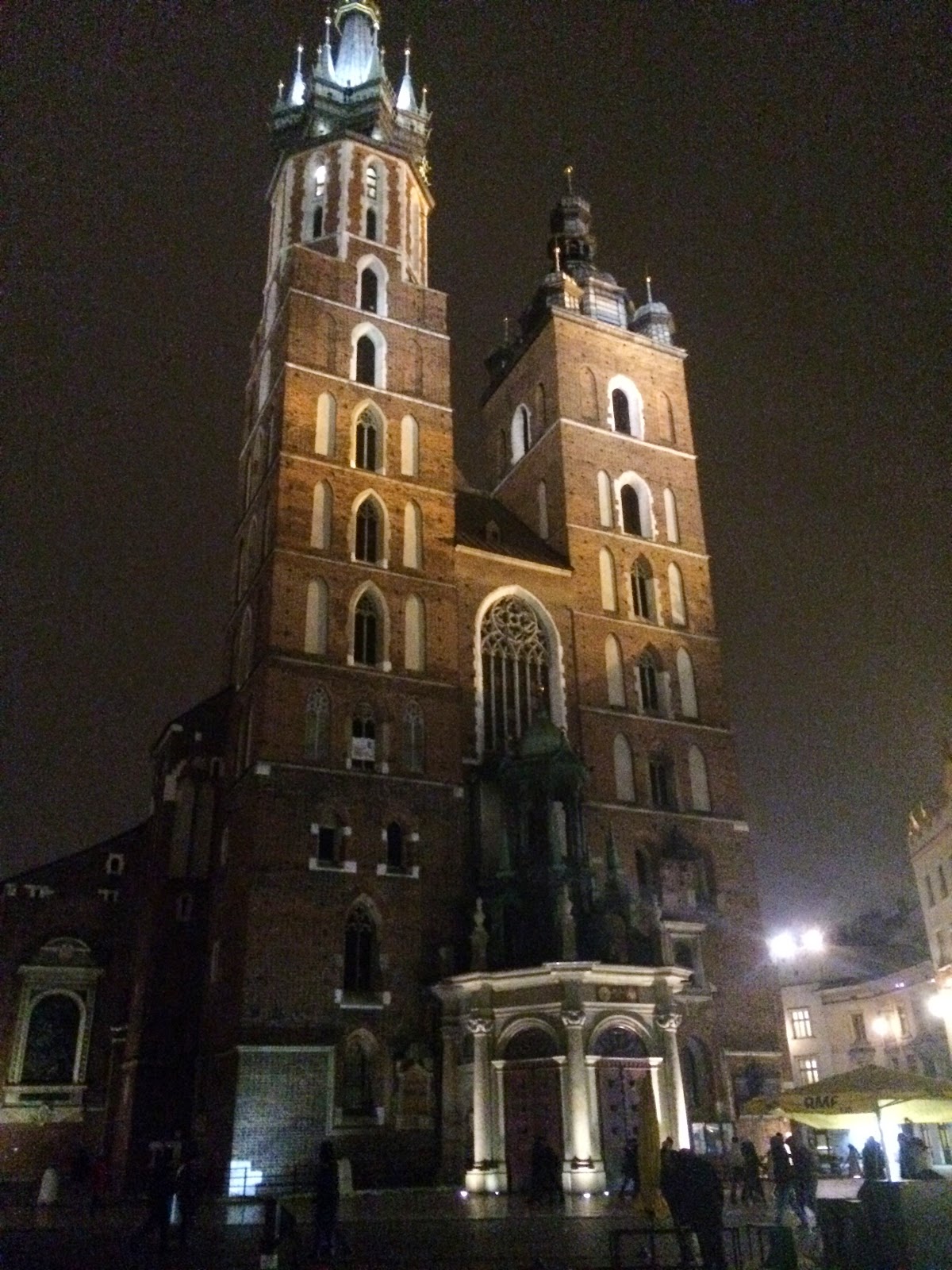

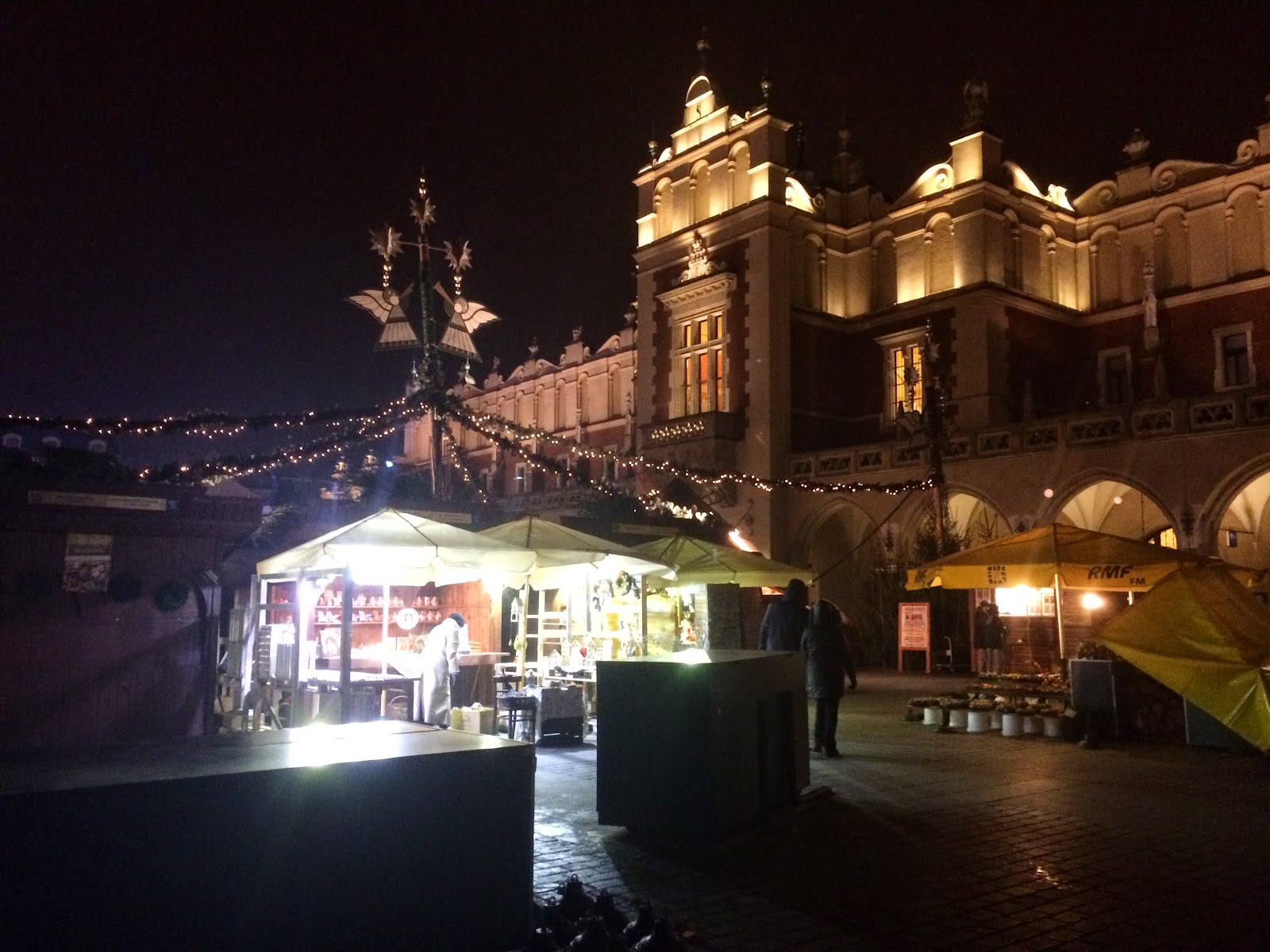


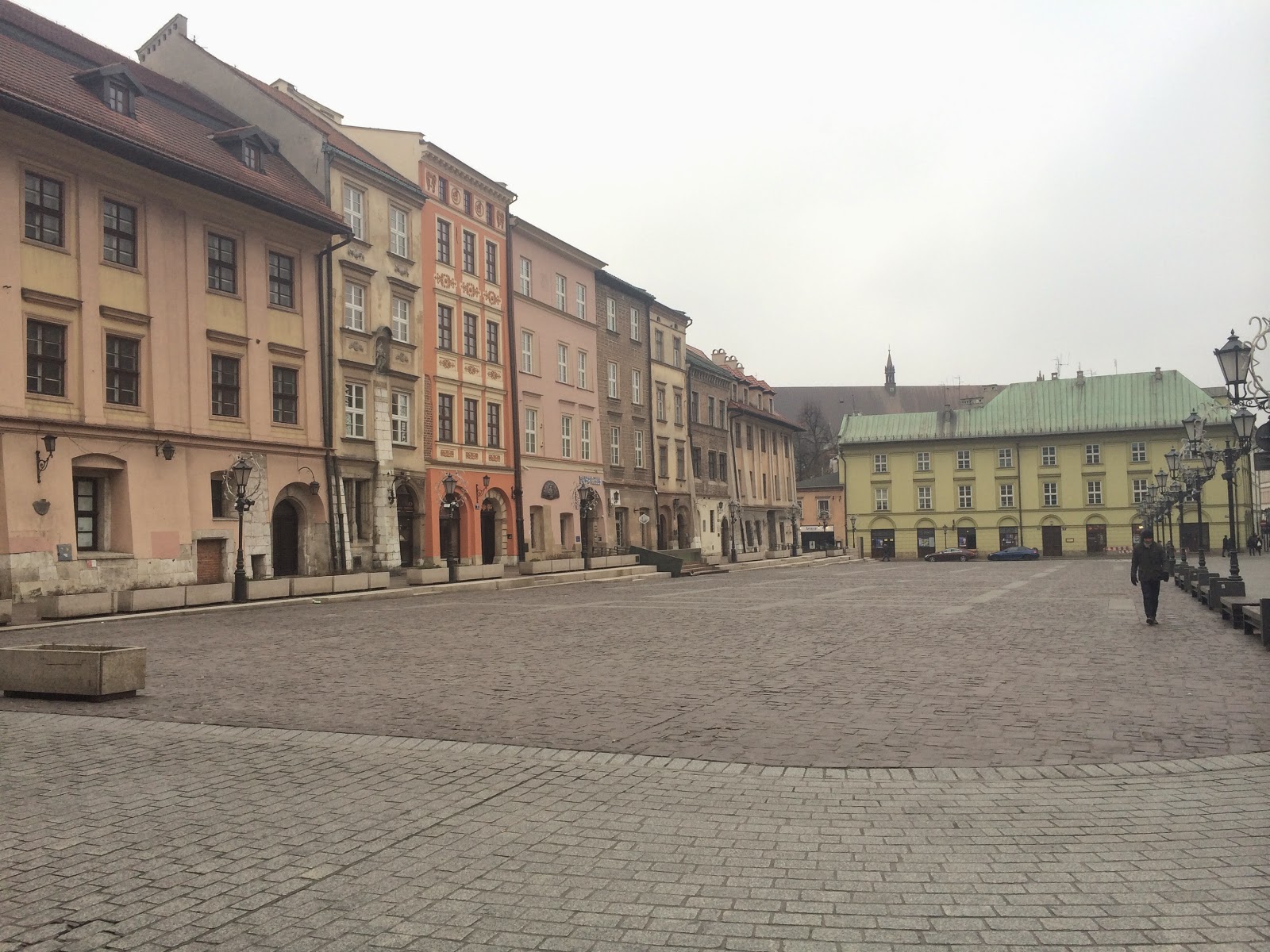
























































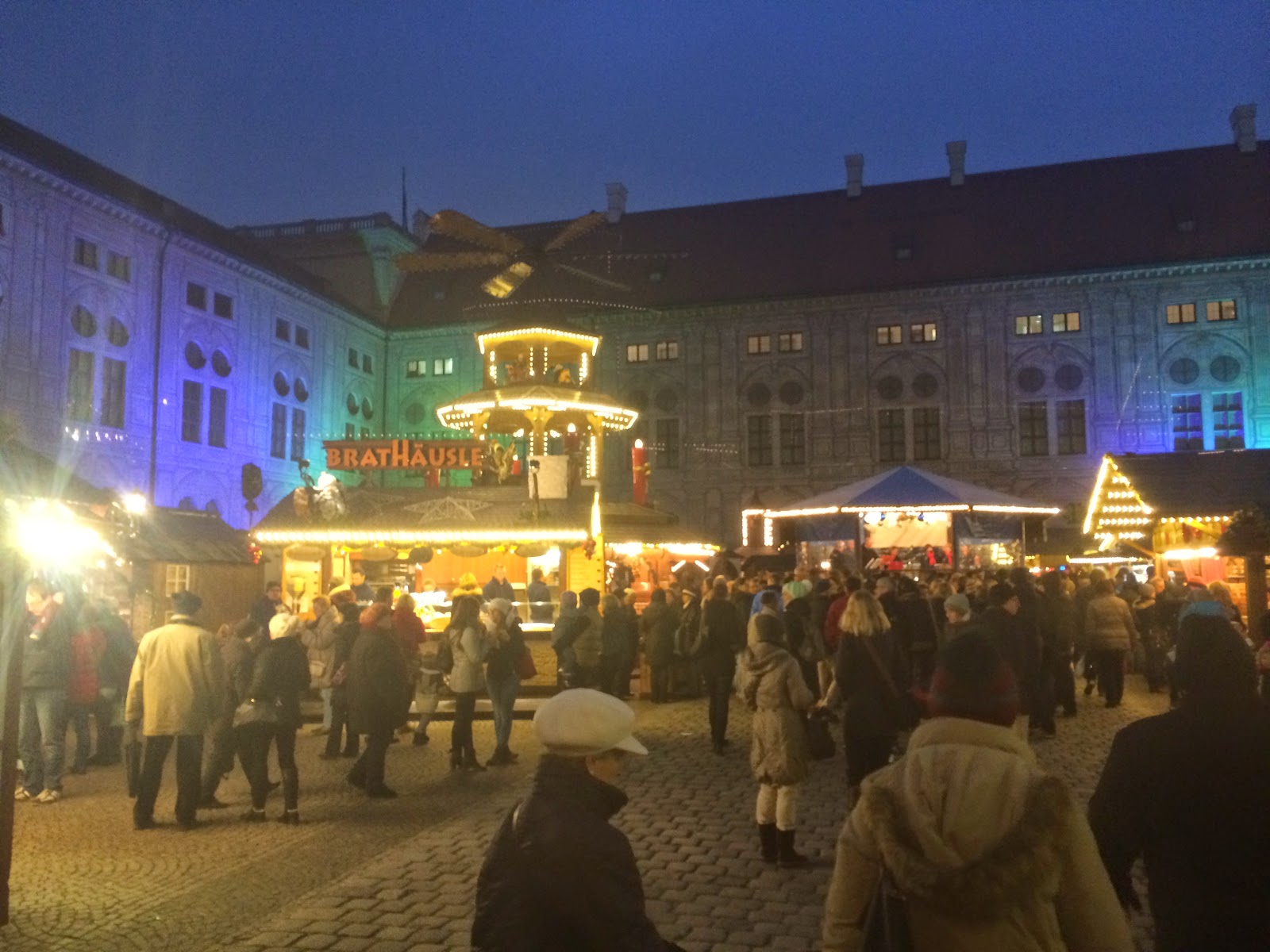























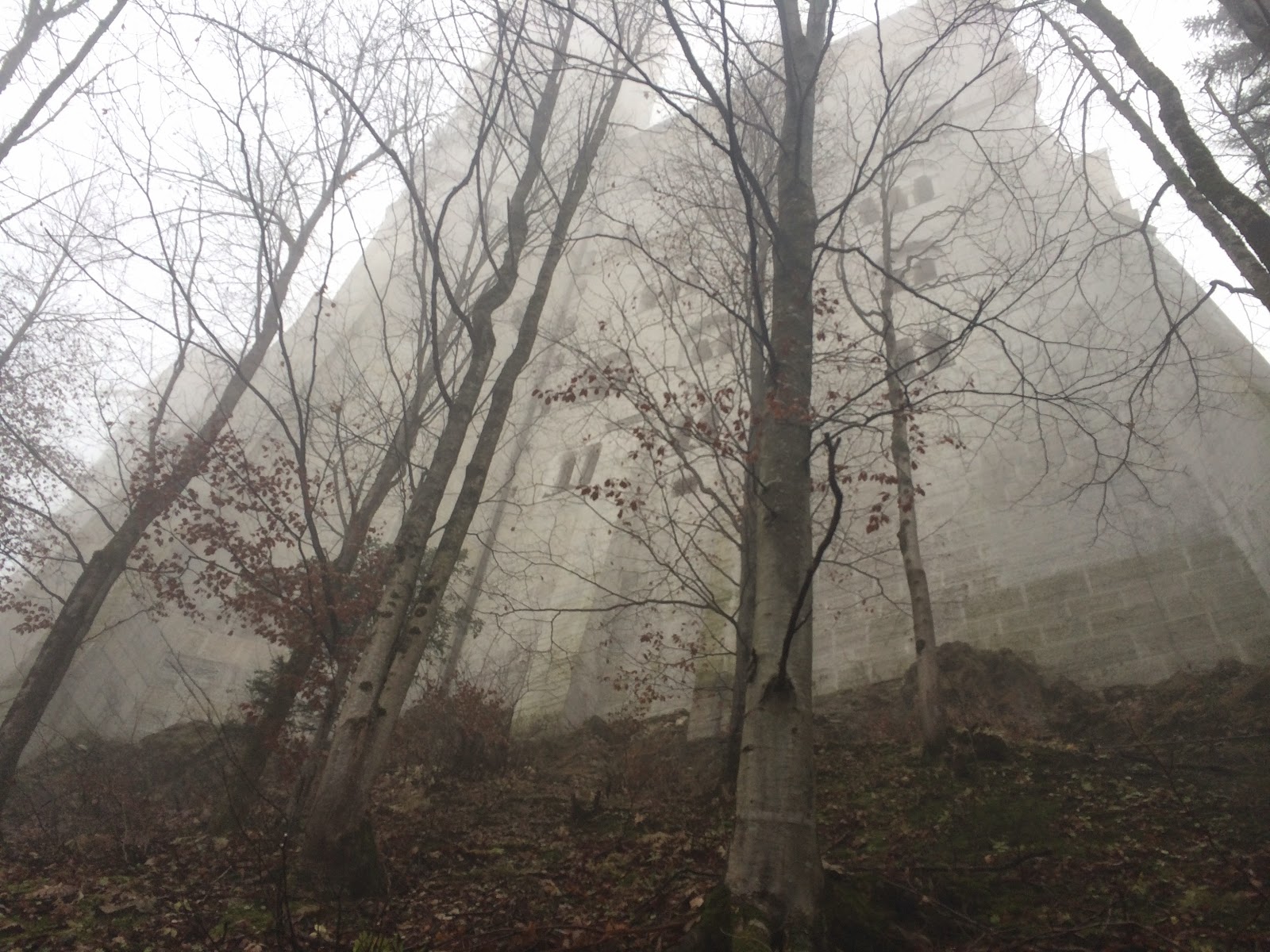















No comments:
Post a Comment